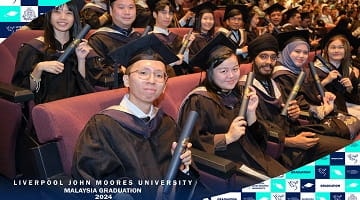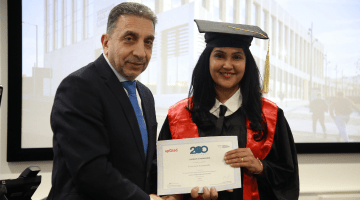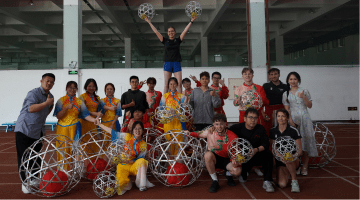About this course
LJMU's Leadership and Management programme supports career progression for managers or those with ambitions to take up a management role.
The MSc in Leadership & Management Practice takes you on a personal leadership discovery of concepts and theories to help you understand your own position in relation to your organisational context and leadership journey: it puts you at the centre of your learning experience. It is a part-time 30-month programme.
The programme has a strong emphasis on recognising that the workplace is an important place to learn. The modules cover a variety of contemporary leadership topics within different areas of a business that open your eyes to new ways of working, help to build self-awareness and confidence in your leadership decisions. You will develop the ability to think critically about traditional, current, and future leadership theories & practices within your organisation, the impact this can have on others and ways in which practice can be improved. Thought leadership will also be employed on the programme, fostering intellectual skills, and addressing the ever-changing nature of leadership and management in the real world.
The programme is personalised to individuals and customised for businesses so that they can apply the necessary management practices to ensure that:
- learners make an immediate impact in their job.
- skills are practiced and knowledge applied.
- time away from work is kept to a minimum with learning happening in the workplace.
Who is it for?
LJMU's Leadership and Management programme has been designed with the Chartered Management Institute (CMI) to meet employer-training needs for middle managers and leaders. It supports career progression for early to mid- career managers or those with ambitions in leader and leadership development from a personal, professional, or organisational perspective.
Benefits
- A personal leadership journey.
- Aids management career progression.
- CMI designed course with Charter Mark recognition.
- Job focused leadership theory and skills.
- Offers an alternative leadership and management development programme to the MBA, focusing on personal practice and development rather than strategic & operational focus.
- Part-Time, Block Taught delivery to support your development alongside your current role.
- Benefit from teaching informed by business research & local business needs.
- Expand your professional network and learn alongside local senior leaders and managers.
- Highly qualified & experienced teaching team.
- Specialised Masterclasses from business leaders.
- Transform your professional practice and enhance career progression prospects.
- All students and alumni benefit from membership of Liverpool Leadership Network.
What our learners say?
“The effect of my newly acquired knowledge of aspects of leadership theory has created a greater confidence in my own abilities.”
“I believe my experience on the course has been key in gaining my recent promotion”.
“This course has changed the way I view leadership. I am much more reflective, and I look for the evidence before making decisions”.
“I am a much different manager now. My tutors, my peers, and my own research have changed my world view”.
Course modules
Discover the building blocks of your programme
Further guidance on modules
Modules are designated core or optional in accordance with professional body requirements, as applicable, and LJMU’s Academic Framework Regulations. Whilst you are required to study core modules, optional modules provide you with an element of choice. Their availability may vary and will be subject to meeting minimum student numbers.
Where changes to modules are necessary these will be communicated as appropriate.
Core modules
Individual Development and Reflection
10 credits
10 credits
This module is an integrated and holistic part of the first year of the programme and seeks to facilitate personal and professional growth and act as catalyst for reflection on learning from other first year modules and the wider aspects of the programme.
Applied Business Research
10 credits
10 credits
The module will provide learners with an understanding of how to design and produce applied business research scholarly-practitioner projects. Learners will be provided with the knowledge and tools to be able to effectively design organisational/business/management research projects that apply to their own organisations or organisations which they are familiar with - learners will have a better awareness of how to become 'scholarly practitioners'.
The module will support and provide foundations for the final element of the programme, either the 'Strategic Business Proposal' (for Senior Leader Apprentices) or the MBA/MSc final consultancy project module (for those undertaking master's degree programmes).
Consultancy Business Project
60 credits
60 credits
Undertaken primarily as an independent self-managed module of study, supported by an academic supervisor with additional guidance provided through the dedicated Canvas site.
Leadership and Leader Development
20 credits
20 credits
By applying theory to your practice, this module will aim to equip you with the knowledge and understanding of the complex dynamics of leadership to help you in your own development and that of leading teams effectively.
In combination with the programme you will explore your strengths and weaknesses as a leader, learn how to articulate effectively your own personal leadership style and those within your organisation and identify effective and ineffective leadership in your context.
Behaviour in Organisations
10 credits
10 credits
You will explore how organisations behave, critically evaluate theoretical perspectives and consider how to enhance performance within your own settings. You will look at real life case studies in addition to considering theories and models. You will critically reflect on your own organisation and consider how you can blend theory and practice in order to benefit your setting.
Leading the Business
20 credits
20 credits
You will gain knowledge of how key business functions support organisational effectiveness. You will learn about marketing, operations and finance and will develop an understanding of how they inter-relate to support leadership and management decision-making.
Strategy and Change
20 credits
20 credits
This module introduces you to theories of strategy formulation, implementation and change. The module will equip students to practically apply external and internal analysis, use methods, tools and models to identify needs for change, and initiate it within organisations to maintain competitive advantage.
Leading Innovation
10 credits
10 credits
Building on innovation theory and best practice, this module aims to develop your ability to think and act innovatively in a range of organisational contexts. You will evaluate opportunities to exploit digital technologies and consider strategies to support and promote innovative practices in your organisation.
Integrated Leadership Strategies
10 credits
10 credits
The aim of the module is to consolidate prior learning and integrate knowledge and skills acquired in other modules.
Learning and Leadership
10 credits
10 credits
After completion of this module you will be able to distinguish and design learning systems to improve the performance and capability of organisational situations. You will build on theories of learning, critical thinking, knowledge management and systems thinking.
Your Learning Experience
An insight into teaching on your course
Study hours
There will be an induction at the start of the programme, and then you will study 30 credits per semester which comprises of 3 taught days for a 10-credit module and 6 taught days for a 20-credit module. This roughly equates to three taught days per month. There will also be masterclasses and additional apprenticeship touch points throughout the 2 years.
Learners will be expected to undertake work on their own and, given the applied approach to assessment, this will demand a degree of self-management and resilience to manage a full-time senior leader work role with part-time study.
In addition to the taught elements, students will spend time preparing for the session. The private study element comprises of independent research, further reading, preparation for taught sessions, follow-up activities and assignment preparation and write-up.
An example is shown below from a 20-credit module:
Total learning hours: 200
Taught element: 48 hours
Private study: 152 hours
What support is offered?
We nurture a supportive and collaborative environment for working with peers and colleagues. There is a highly qualified and experience academic programme team to support your academic development. All learners will have a personal academic tutor.
Teaching methods
Our flexible delivery approach involves face-to-face teaching and facilitation, blending online support & live online sessions for individual and group tutorials. Classroom sessions are devised as an interactive, learner-centred experience with group activities playing a large part in the learning experience. In addition, the teaching approach will utilise a ‘flipped learning environment’ as well as technology, when appropriate, to maximise learning opportunities.
As this is a Level 7 course, we encourage criticality and provide students with key texts for further discussion in sessions. We critically examine case studies, look at examples of successes and challenges within the real world and engage in simulation activities. We use a variety of tools to encourage self-reflection.
The Virtual Learning Environment (Canvas) gives you access to teaching and materials wherever you study and allows information and resources to be shared in advance of taught sessions and it also serves as a repository for module-based materials including assessment guidance & submission, reading lists, contact information and signposting to further resources. Some modules use the discussion board feature to incorporate tutor led support and peer to peer communication.
Applied Learning
At the centre of our philosophy is the notion that we learn best from experience and applying our learning, so action learning and coaching are a key part of our programmes. This approach also encourages strong peer learning groups where you can learn from your peers, in recognition of the fact that management and leadership development is a social and collaborative process.
A strong emphasis is placed on the workplace as a place to learn; consequently, everybody brings their experience from their area of expertise with them, and you will be encouraged to share how your learning has been applied and improved practice in your workplace. The programme is personalised to individuals so that you can apply your learning to your own workplace projects and tasks and participants integrate key concepts and theories, assessing the impact of these on their own working environment. This approach also provides a forum for learners to bring ideas, thoughts, issues, and actionable remedies to the forefront. The ability to analyse organisational issues and apply recommendations supported by a theoretical framework is a fundamental element of the programme and will provide learners the confidence to diagnose and resolve problems from the workplace.
Techniques include:
Recognising the workplace as an important place to learn: Learners will apply ideas in the workplace, improving their skills through a range of workplace activities and then reflecting and reviewing this practice with peers on the programme.
Self-development planning: Organisational processes can be applied to ensure that individuals plan to develop their own strengths in line with business competencies and values, and to recognise their own personal needs.
Using 'flipped learning': This reverses the conventional process of teaching by providing the content prior to the teaching and learning session using a virtual learning environment, so that the focus of the workshop becomes about active learning and application of theory to practice. The flipped learning environment allows for the teaching experiences to probe learning and development through facilitation suited to the executive education experience.
Coaching and peer-to-peer coaching: Coaching not only enables the individual learner to tailor the programme to meet their needs, but it also provides the opportunity for the organisation to propose business critical skills and values which can become a part of the development activities.
Action learning: This will be adopted as a supportive and collaborative approach to learning to manage. Action learning will be used to support personal development, where issues and challenges from the workplace can be discussed.
Projects: For each theme there is the possibility of designing an in-company project or series of projects to ensure that business needs are met.
Masterclasses: Keynote speakers will address current issues, emerging practice and thought leadership.
How learning is monitored on your programme
To cater for the wide-ranging content of our courses and the varied learning preferences of our students, we offer a range of assessment methods on each programme.
Knowledge and skills are assessed through individual work-related assessments, which may be supplemented with group activities.
The predominant assessment methodology is one piece of individual coursework per module, which will require participants to relate their learning to an organisational setting. These assessments will normally be developed from their own experience or setting by each individual student through the module activities with the application of theory to practice being a key element of the programme. In the initial 20 credit module, the emphasis will be on a portfolio of work, bringing together different facets of learning activities enabling them to develop a broad understanding of themselves and their overall objectives for the duration of the programme.
The assessment methodology, as set out above, provides the opportunities for participants to demonstrate knowledge and skills. In addition to this, a 'flipped learning' approach will also be encouraged, providing content prior to the teaching and learning session using the university’s VLE, this approach brings the focus onto action learning, enabling the application of skill development.
Qualifying Awards
To be awarded the PGCert, all core modules must be completed.
To be awarded the PGDip, modules from the specialist pathways must be completed along with the core modules.
To be awarded the MSc, the business consultancy module must be completed along with the core modules and the chosen pathway modules.
Course tutors

Victoria McCall
Programme Leader
Victoria has worked in higher education for over 15 years having previously worked in a management role for The Estee Lauder Group. Victoria joined Liverpool Business School in 2022 and is Programme Leader for the MBA and Executive Education programmes including the MBA, MBA Scale-Up, MSc Leadership and Management Practice, and the associated Senior Leader Apprenticeship Programmes as well as the CMDA. Victoria is a Senior Fellow of the Higher Education Academy (SFHEA), and lectures in the areas of executive leadership, strategy, and digital marketing. She has been awarded several Teaching Excellence Awards, including the British Academy of Management Education Practice Award in the Early Career Teaching Practitioner Category for her work implementing innovative, creative, hybrid learning teaching environments. Victoria’s research interests include digital and social media marketing, leadership, and pedagogic innovation and she also holds the post of external examiner for London College of Fashion, University of the Arts London.
-
 Lecturer/Senior Lecturer
Lecturer/Senior Lecturer -

Career paths
Further your career prospects
LJMU has an excellent employability record with 96% (HESA 2018) of our postgraduates in work or further study six months after graduation. Our applied learning techniques and strong industry connections ensure our students are fully prepared for the workplace on graduation and understand how to apply their knowledge in a real world context.
It is expected that graduates from this programme will have an improved career trajectory and we are committed to giving you the next level of knowledge for a higher salaried position and to be able to move more quickly and with confidence up the career ladder. The curriculum covers the broad range of business disciplines that prepares and enables you to work at board level, or in new enterprises. Importantly, many graduates have used the confidence and skills they have developed on the programme to achieve their aspirations and move across sectors and industry boundaries.
You will see a marked improvement on:
- Your day-to-day performance, confidence and learning in the workplace.
- Utilise new skills combined with experience to show new management thinking.
- Confidence in decision making, contributions to idea generation and business improvement.
Another benefit of studying at the Liverpool Business School is joining a network of senior professionals. This enables alumni and staff to continue building meaningful, long-term relationships beyond the classroom, as part of the Liverpool Leadership Network.
Liverpool Business School at Liverpool John Moores University is a member of AACSB International — The Association to Advance Collegiate Schools of Business. AACSB International is a global association of leaders in education and business dedicated to supporting and advancing quality business education worldwide. Through membership, accreditation, research, thought leadership, professional development, and advocacy, AACSB partners with over 1,500 organizations, from more than 90 countries globally. Membership or participation in the Global Education Alliance does not imply accreditation.
Qualification & degree awards
We recognise the impact that good leaders can have on productivity and performance, Businesses are increasingly recognising the importance and value of trained managers and are seeking professionals with recognised qualifications in leadership and management.
The MSc is a respected and globally recognised master’s level qualification in business and demonstrates to employers that your professional practice is underpinned by academic knowledge and evidence-based research.
There are 3 awards available to learners who undertake this programme.
Master of Science Full Award (MSc)
180 Credits: All modules to be completed including the 60 credit Consultancy Business Project
Postgraduate Diploma (PG Dip)
120 Credits: All taught modules to be completed.
Postgraduate Certificate (PG Cert)
60 Credits: All core modules to be completed.
Tuition fees and funding
- Part-time per year:
- £4,605
The University reserves the right to increase tuition fees in accordance with any changes to the maximum allowable fees set by the UK Parliament. In the event of such a change, any fee increase will be subject to a maximum cap of 10% of the total course cost as originally stated at the time of your offer.
Fees
The fees quoted at the top of this page cover registration, tuition, supervision, assessment and examinations as well as:
- library membership with access to printed, multimedia and digital resources
- access to programme-appropriate software
- library and student IT support
- free on-campus wifi via eduroam
Additional costs
Although not all of the following are compulsory/relevant, you should keep in mind the costs of:
- accommodation and living expenditure
- books (should you wish to have your own copies)
- printing, photocopying and stationery
- PC/laptop (should you prefer to purchase your own for independent study and online learning activities)
- mobile phone/tablet (to access online services)
- field trips (travel and activity costs)
- placements (travel expenses and living costs)
- student visas (international students only)
- study abroad opportunities (travel costs, accommodation, visas and immunisations)
- academic conferences (travel costs)
- professional-body membership
- graduation (gown hire etc)
Funding
There are many ways to fund postgraduate study for home and international students. From loans to International Scholarships and subject-specific funding, you’ll find all of the information you need on our specialist postgraduate funding pages.
Please be aware that the UK’s departure from the EU may affect your tuition fees. Learn more about your fee status and which tuition fees are relevant to you.
Entry requirements
You will need:
Qualification requirements
Undergraduate degree
A bachelor’s degree with a 2.2 (hons) is required and at least three years’ relevant strategic management or leadership experience. Alternatively, a minimum of five years’ relevant strategic management or leadership experience would be considered if no prior degree is held.
Alternative qualifications considered
: If you do not meet the admissions criteria above, the course team has a strong commitment to widening participation and positively welcomes non-standard applicants. Candidates with some management experience or those who are about to enter a managerial role and have a demonstrated aptitude for study may still be considered dependant on circumstances and this can be discussed with the Programme Leader prior to application.
Additional requirements
-
Relevant work experience
Applicants should be employed in a job role in which they contribute to leadership and management relating to their area of responsibility within the organisation.
Further information
- Extra Requirements
-
RPL
Credits may be awarded for learning already undertaken in the University or elsewhere for which you have received qualifications or certificates and you may submit a claim for recognition of unaccredited prior learning (RP(E)L). This may be for work you have accomplished in a professional, paid, or voluntary capacity. This must be submitted via an RPL form with supporting evidence. You will also be liable to pay an administration fee and charge per credit. All RP(E)L claims must be applied for at the point of admission and cannot be considered at a later stage.
International requirements
IELTS
Where English is not your first language, or your first degree was not taught and assessed wholly in English, an IELTS score of 6.5 must be achieved, with no individual score of less than 5.5. The programme complies fully with the requirements of the Equality Act 2010
Further information
- Extra Requirements
-
RPL
Credits may be awarded for learning already undertaken in the University or elsewhere for which you have received qualifications or certificates and you may submit a claim for recognition of unaccredited prior learning (RP(E)L). This may be for work you have accomplished in a professional, paid, or voluntary capacity. This must be submitted via an RPL form with supporting evidence. You will also be liable to pay an administration fee and charge per credit. All RP(E)L claims must be applied for at the point of admission and cannot be considered at a later stage.
Please Note: All international qualifications are subject to a qualification equivalency check.
How to apply
Securing your place at LJMU
To apply for this programme, you are required to complete an LJMU online application form. You will need to provide details of previous qualifications and a personal statement outlining why you wish to study this programme.
Your university life
From accommodation and academic support to clubs and societies. Find out what LJMU has to offer.
Related Links
Talk to our students
Connect with a current LJMU student for advice and guidance on university life, courses and more.
See what our students are saying
At LJMU we want you to know you’re making the right choice by studying with us. You can see what our students are saying about their experience with us through their reviews on the following websites:
Related Links
News and views
Browse through the latest news and stories from the university










The University reserves the right to withdraw or make alterations to a course and facilities if necessary; this may be because such changes are deemed to be beneficial to students, are minor in nature and unlikely to impact negatively upon students or become necessary due to circumstances beyond the control of the University. Where this does happen, the University operates a policy of consultation, advice and support to all enrolled students affected by the proposed change to their course or module.
















